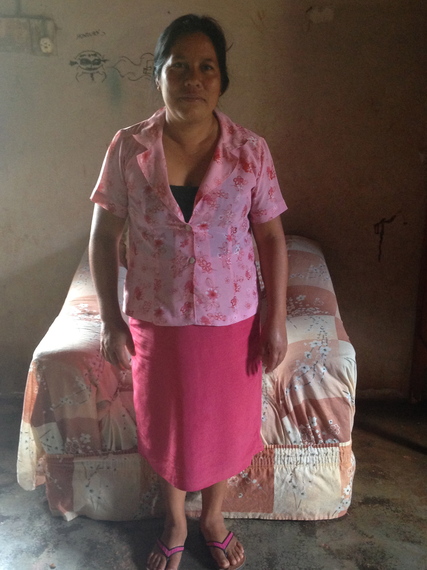I had felt sure that I would recognize the face of hardship immediately. Hers would be embattled and drawn, I had decided, a confusing map marked with inequalities, misfortune, and no legend available to help untangle them all. When I first met Doña Celia, the silver-haired forty-year-old mother and grandmother with a bouncy gait and infectious smile, I was sure that she wasn't representative of the kind of hardship I had expected before arriving here. But before long, as coffee and conversation began flowing in her small adobe home, I was given an altogether different map to ponder.
This one featured the terrain of the Sierra Madre mountains, a towering evergreen army that makes the beauty of the state of Chiapas, Mexico unmistakable. For a Harvard College student who would be spending the semester living and working here with Compañeros En Salud (CES) in the small Sierra community of Honduras, walking along its red dust-laden paths was to be a lesson in understanding the many faces of hardship that exist within the complicated healthcare landscape that has been established here.
As we watched one of Doña Celia's many grandchildren waddle past on the cement floor between us, she began to speak about her experiences in seeking healthcare in a region that had been without reliable access to a physician for the better part of the last half-century.
Her father had died when she was very young, Doña Celia told me, and was survived by her mother and the six children whom she would now have to raise on her own. In a setting of already limited resources, this family tragedy meant additional sacrifices -- ones that were often taken on by the women of the household.
"They didn't value women," she continued, "and they would say that only the boys should study." Doña Celia herself would only finish primary school. Before long, adolescence too would bring new challenges. With little disposable income available to the family, she felt that she had few other options but to get married at the age of fifteen and to seek support from her new husband. Meanwhile, she had one brother who began drinking and later suffered in a brutal car crash, she said, now brushing away the shallow pools that had begun welling up in her eyes. There was no doctor at that time, only a nurse, and so seeking medical attention for him would have meant paying exorbitant costs for transportation to the nearest medical facilities that were located one to two hours away in Siltepec or Motocintla."Before, we suffered a great deal," she said with a striking degree of finality.
But the story was about to change.
The Compañeros En Salud/Partners in Health-run community clinic was established in Honduras two years ago, and even in those two years, Doña Celia said that she had felt the difference.
"The help was substantial because before, the nurse didn't have many resources --nothing more than oral rehydration therapy, the ability to sew up a wound, and to give Paracetamol (a common pain reliever). Now, there are medications and the chance to receive relief with the doctor in the clinic," she said.
But for some, like her brother, that change came too late. Without medical attention for the injuries he suffered in the accident and the pain that resulted, he couldn't return to school. Instead, he was forced -- like so many of his forebears -- to dedicate his life to the land as a campesino (farmworker). However, in the current climate of poor harvests and falling coffee prices, the many Chiapanecans who are famous for their rich coffee crop are suffering immensely for the production of it.
"Here the work of the farmer is not valued anymore; nobody pays them," said Doña Celia. She is hopeful that her children and grandchildren will not be forced to make the same choice.
In hearing Doña Celia's story, I could begin to understand that the reliable access to healthcare provided by CES/PIH was not just about treating the consequences of physical pain, but too about addressing its deeper origins. The medications provided by the social service year physician here are not merely palliatives, but instead a kind of treatment that gives patients the chance to rethink the circumstances of the past and, in doing so, to imagine different possibilities for the future of their children and grandchildren. Doña Celia said that she thought her brother's story might have turned out differently if there had been reliable medical care available when he suffered his accident. It would have allowed him to continue with his education and perhaps pursue a career that would have better supported his family.
Even as she wiped the now freely flowing tears from her eyes, I could see her face shining brightly at the thought. The CES/PIH doctors that I have seen administering medical care in the Sierra Madre of Chiapas have not "solved" the myriad barriers to education faced by many here, certainly, nor do I think that they will achieve this alone. But in the meantime, what they are doing is empowering people to believe that with a physically strong and healthy body, they can overcome these barriers themselves. For people like Doña Celia, this is what will make it possible to address the deeper origins of pain so that both healing and growth can follow.
Soon dusk was descending on the Sierra, and I could almost smell the myriad baskets of homemade maize tortillas that were being placed on dining tables all around me as the families of Honduras sat down for dinner. Bidding Doña Celia goodbye, I walked the short way back to my host family's home and reflected on the conversation that we had just shared. Considering all that I had learned, there was at least one thing that I felt I had been right about from the start.
Doña's Celia's wasn't the face of hardship -- no, rather hers was unmistakably, and extraordinarily, the countenance of pure courage.
